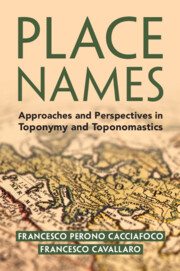Book contents
- Place Names
- Place Names
- Copyright page
- Contents
- Figures
- Tables
- Preface
- Acknowledgements
- 1 Introduction
- 2 Language Change
- 3 Historical Toponomastics
- 4 Toponymy and the Historical-Linguistic Reconstruction of Proto-Languages
- 5 Diachronic Toponymy
- 6 Landscape and Toponymy
- 7 Historical Toponomastics and Historical Geography
- 8 Synchronic Toponymy
- 9 Place Names and Society
- 10 Toponymy and Cartography
- Glossary
- References
- Index
2 - Language Change
Published online by Cambridge University Press: 02 March 2023
- Place Names
- Place Names
- Copyright page
- Contents
- Figures
- Tables
- Preface
- Acknowledgements
- 1 Introduction
- 2 Language Change
- 3 Historical Toponomastics
- 4 Toponymy and the Historical-Linguistic Reconstruction of Proto-Languages
- 5 Diachronic Toponymy
- 6 Landscape and Toponymy
- 7 Historical Toponomastics and Historical Geography
- 8 Synchronic Toponymy
- 9 Place Names and Society
- 10 Toponymy and Cartography
- Glossary
- References
- Index
Summary
Languages are constantly changing. The reasons for the changes can be both internal (i.e., when monolingual speakers adopt new ways of saying things according to social factors like age, gender, and class) and external (e.g., language contact). Although toponyms are ‘linguistic fossils’ that tend to retain older linguistic features and can withstand violent population shifts more so than the general lexicon, they are also affected by the process of language change. This is explored through several examples from around the world. It is only through analysing language change – with an approach that incorporates historical-linguistic methodologies like the comparative method and dialectological interpretations – that a toponymist can reconstruct the original (and most remote) toponymic root of a place name. The latter half of the chapter demonstrates how toponyms can be used to ‘crack’ hitherto undeciphered languages, the most notable being Linear B (a syllabic writing system transcribing Mycenaean Greek, an archaic form of Ancient Greek). The authors also apply an experimental methodology, using toponyms, to provide a possible interpretation of place names possibly transcribed through Linear A (the grammatological ancestor of the Linear B writing system).
Keywords
- Type
- Chapter
- Information
- Place NamesApproaches and Perspectives in Toponymy and Toponomastics, pp. 24 - 45Publisher: Cambridge University PressPrint publication year: 2023

